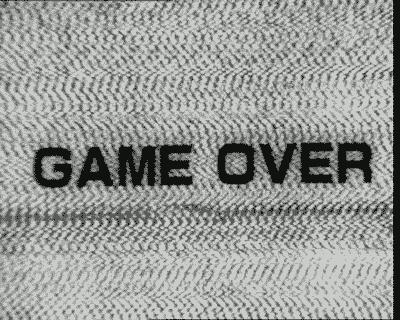

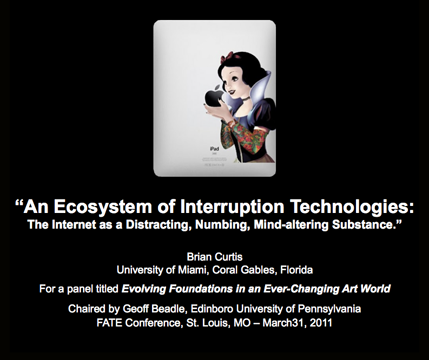
at the 2011 FATE Conference in St. Louis, MO, March 31, 2011
for a panel titled "Evolving Foundations in an Ever Changing Art World"
Chaired by Geoff Beadle, Edinboro University of Pennsylvania

I wrote that proposal nine months ago and unfortunately it is not a topic I am comfortable addressing today. It isn’t that I have lost confidence in or commitment to the accuracy, importance, and relevance of what I had proposed, it is just that, in the intervening months, I found myself exploring those identical issues in depth in panel presentations at both last fall’s SECAC and at this year’s CAA. For anyone who might have been encouraged to attend today’s session to hear me speak on the Duchampian excesses in the art world I can only apologize for the inconvenience and refer you to my personal web site (www.brian-curtis.com) where both papers are available.
In place of my initial proposal I will focus my attention on another issue that is equally critical to our role as educators: whether the 8.5 hours a day the average American spends staring at a screen of some sort of electronic device compromises intellectual development and whether it is causing widespread cultural disruption.

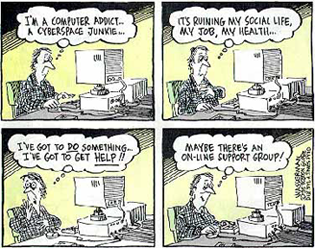
So, for the sake of clarity and consistency, permit me to re-title today’s presentation “An Ecosystem of Interruption Technologies: The Internet as a Distracting, Numbing, Mind-altering Substance.”
I first addressed this topic six years ago (2005) in a paper titled “Is the Technological Cart Pulling the Pedagogical Horse?” When I wrote the paper, vocal critics of the “digital revolution” were receiving very little attention in the mainstream news. Techno-euphoria was in full swing with the notion that the computer increases productivity, makes us smarter by providing access to free information resources, speeds up the learning curve, provides job skills for the technological world, and, perhaps most importantly, provides us with a democratizing template that will push the world toward universal human rights and individual freedom. That was then, and remains today, an impressive list of the virtues of digital technology. The question is whether any of it is true.

Back in 2003 the techno-utopian cheerleaders consistently avoided ever mentioning digital technology’s considerable downside. With events like those we witnessed at the Fukushima Daiichi nuclear power plant I am sure you are all well aware that all technologies come with unintended consequences. And while the downside of digital technology is nowhere near as dramatic and immediate as a nuclear meltdown, it might, in the long run, actually have greater societal implications.

The current wave of techno-utopianism is fueled by governmental and corporate hucksterism in support a marketing-saturated, hyper-consumer society that is built upon a theory of perpetual economic growth that is both politically and environmentally unsustainable. Is it any wonder then that corporations and their paid-for-politicians continue to ignore thoughtful analysis of the data that links computer usage to serious disruptive changes in education, societal ethics, the economic lives of the middle-class, the fabric of human culture, and the rights, privacy, and security of individuals?

By piggy-backing on images of cultural luminaries of the first half of the 20th century Apple promoted the personal computer as a revolutionizing tool for world-changing personal creativity while ignoring a computer's vulnerability to becoming a tool for corporate monopolization and the anti-dempcratic distortion of civic and political discourse
As early as 1995 Richard Sclove, founder and former executive director of the Loka Institute and author of Democracy and Technology directly challenged the Internet’s claim to expand individual freedoms. His position revolved around the fact that the Internet is shaped by commercial interests rather than civic ones. He prediction of a “cybernetic Walmart” whereby online commerce controls absolutely every sector of the economy, including local service providers becomes more accurate every day. According to Sclove online commerce isolates us, weakens our sense of community and, in the process, undermines democracy. He goes on to suggest that,
“The antidemocratic implications of the Cybernetic Wal-Mart reach even further. New “stateless” megacorporations are “leaping boundaries” to intimidate labor unions, elude domestic political opposition, threaten meddling government officials with plant closure and capital flight, and “sidestep regulatory hurdles.” The locus of effective political intervention thus shifts toward more distant power centers. Businesses, moreover, are using computer networks to consolidate high-level managerial control over their expanding global operations and corporations are becoming ever more empowered relative to individual workers, trade unions, and even national governments.”
In an intriguing article from 1997, Jerry Mander, who until recently was executive director of the International Forum on Globalization and who had earlier in life been a highly successful advertising executive before becoming a media theorist, raises serious questions about who benefits most from the expansion of digital technology. He describes the ultimate goal of economic globalization as a corporate monoculture.

Currently, in what Mander considers a culturally disastrous development, more than 70% of global information in terms of film, books, newspapers, entertainment imagery, and internet outlets, is being sent out to hundreds of millions of people by seven gigantic global media corporations whose primary motivation in packaging their content is to protect their corporate interests, increase their profits, and expand their market share. This represents the greatest concentration of ownership of any industry in the world.
The Internet, rather than offering us a greater variety of commercial outlets, as initially promised, is increasingly dominated by an oligarchy of online mega stores that controls the majority of Internet commerce. As a result, small brick and mortar community businesses, the bedrock of a free-market economy, find it impossible to compete. Additionally, major cultural industries are being decimated. Music, publishing, movies, newspapers, and radio and TV broadcasting are all losing out to the Internet. It is predicted that within 15 years half of the world’s newspapers will close and there is mounting evidence that the web does not create jobs for those it destroys.

This centralization of corporate power is directly assisted by the rules of the WTO and other global institutions that grease the pathways for corporate investments, takeovers and mergers. We surely know that corporations and governments are pretty excited about the computer revolution, and that they keep selling it to us via terms like 'empowerment' and 'freedom'.

We recently experienced just such a promotional barrage on the effectiveness of digital technology for spreading democracy and freedom from corporate news media during the recent unrest in both Iran and Egypt. That would be great if it were true. However, Evgeny Morozov, currently a visiting scholar at Stanford University, in his book published just this past January, The Net Delusion: The Dark Side of Internet Freedom, presents compelling and sobering evidence that the Internet is grossly misrepresented when promoted as a democratizing technology because it is more likely to be used by populations worldwide for entertainment purposes, is censored by governments in ways that are not easily circumvented, is used as a tool for propaganda by power elites from both governments and corporations, and is used to spy on and track down dissidents and infiltrate protest groups. He says,
“Social networking, then, has inadvertently made it easier to gather intelligence about activist networks. Even a tiny security flaw in the settings of one Facebook profile can compromise the security of many others. A study by two MIT students, reported in September, showed it is possible to predict a person’s sexual orientation by analyzing their Facebook friends; bad news for those in regions where homosexuality carries the threat of beatings and prison. And many authoritarian regimes are turning to data-mining companies to help them identify troublemakers. TRS Technologies in China is one such company. It boasts, “thanks to our technology, the work of ten internet cops can now be done by just one.”
In my 2003 paper, the social theorists I referred to relied mostly on anecdotal observations and philosophical insights. Today, however, their intuitive judgments are being upheld by empirical evidence and scientific data that prove that the majority of the promotional hype around digital technology has little to no factual basis.
In 2005 Stanford University scientists polled nearly 2,600 people in all 50 U.S. states last year to analyze their computer habits. Telephone interviews found that 69 percent of people regularly go online and nearly 14 percent found it hard to stay away from cyberspace for more a few days. Most disturbing, 6 percent of respondents said their personal relationships suffered because of time spent on the computer. And remember, this survey predates the launches of YouTube, Facebook, Twitter, and Wikipedia.

Dr. Elias Aboujaoude -- principal author of the study and head of the Impulse Control Disorders Clinic at Stanford University School of Medicine -- says their investigation was the result of an alarming rise in patients seeking treatment for excessive computer use.
"We are seeing more people who lost their jobs because of too much time spent surfing the Internet during work," he says. "More relationships are breaking up because of spouses sneaking out of bed to check e-mail in the middle of the night."

Curiously, Aboujaoude found many of his patients who had been fired from their jobs because of excessive time viewing Web sites were viewing sites with content not traditionally associated with addictive behavior. Such research raises the possibility that computer usage itself may be addictive.
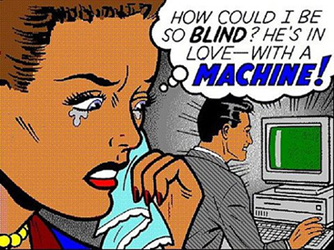
In 2007 Andrew Keen wrote a book titled The Cult of the Amateur: How Today’s Internet is Killing Our Culture. His book documents how the Internet is dismantling our rich cultural bedrock of professional media specialists composed of writers, editors, agents, talent scouts, journalists, publishers, musicians, reporters, and actors by facilitating copyright infringement. He goes on to suggest that stealing intellectual property is among the most pervasive activities on the Internet and that this copyright infringement is reshaping our culture by undermining our ethical commitment to the rights of individuals to benefit from their creative work.
However, even more troubling than the negative cultural and economic impact we are experiencing in this digital age is the disruptive influence the Internet is having on human intelligence and learning ability. In an article published in early 2009 in Science, prominent developmental psychologist Patricia Greenfield reviewed more than 40 studies of the effects of various types of media and concluded that,
“Our growing use of the Net and other screen-based technologies,” has led to the “widespread and sophisticated development of visual-spatial skills (video games).” But those gains go hand in hand with a weakening of our capacity for the kind of “deep processing” that underpins “mindful knowledge acquisition, inductive analysis, critical thinking, imagination, and reflection.”
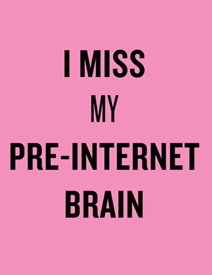
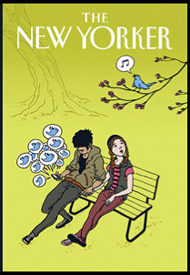
Nicholas Carr’s 2010 book, The Shallows: What the Internet is doing to Our Brain,” documents neurological research on learning and memory that indicates that we learn best “when senses and thoughts are concentrated” and when we disengage from “the flow of passing stimuli toward an inward flow of words, ideas, and emotions.” The behavior that best promotes this kind of concentration is slow reading from a book.

According to neuroscience, the working (conscious) memory is only capable of processing two to four pieces of information at a time. This input limitation is known as the cognitive load. Carr likens slow reading to a faucet dripping to describe how well suited slow reading is for maintaining a functional cognitive load thereby maximizing the absorption of information and the forging the neural links essential to creating thinking.

Overloading our cognitive capacity consistently results in diminished comprehension and blocks the brain’s ability to form the associative neural links that we call intelligence.

The fundamental design of the Internet encourages rapid, distracted, sampling of small bits of information from a seemingly infinite number of sources. Faced with this cacophony of data that is constantly in flux computer users become ever more adept at scanning and skimming in what can accurately be described as state of permanent distractedness. Internet usage damages our capacity for concentration, contemplation, and reflection.
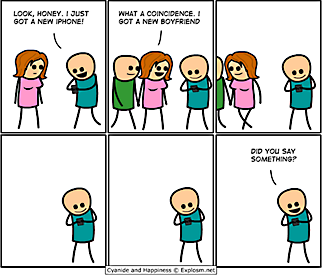
What we are witnessing are minds consumed by a medium. Keep in mind that the two most common causes of cognitive overload – extraneous problem solving and divided attention are the two most common characteristics of the Internet. Using the Net actively impedes deep learning and thinking. Carr tell us,
“Reading online is a stressful cognitive act that inhibits deep reading, comprehension and retention. The Web is a technology of forgetfulness. We are devolving from being cultivators of personal knowledge to being hunters and gatherers in the electronic data forest. Ironically, the fact that book reading understimulates the senses is what makes the activity so intellectually rewarding.”

Carr also points out that the troubling data about cognitive overload also has implications regarding emotional maturity. Empathy and emotion have also been shown to develop most intensely when the brain processes data slowly. The more distracted we become while processing data, the less able we are to experience the subtlest, most distinctive forms of empathy, compassion and emotion. As the Net reroutes our neural pathways and diminishes our capacity for contemplation, it is simultaneously altering the depth of our emotions as well as our thoughts. Being deprived of concentration and empathy are the recipe for becoming less human.

Well, I am running out of time. For any of you who have an interest in this topic, I strongly encourage you to ‘slow read’ Keen’s Cult of the Amateur and Carr’s The Shallows.
If you are among the educators who have observed that the digital world our students choose to inhabit is producing shorter attention spans, diminished interpersonal communication skills, and a marked reduction in the ability to think deeply and abstractly, let me encourage you to promote the value and importance of slow-reading, challenge your students to think logically, encourage them to feel, teach them to care, instruct them on how to draw, paint, sculpt, model, print, design, and weave before exiling them to Cyberspace.” We can make a difference
